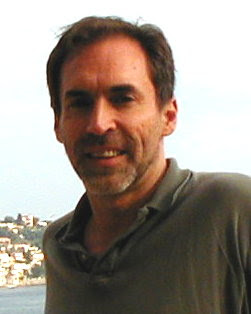Keynote #1 – Sir Ken Robinson
As he did happen to mention, Sir Ken is the author of Out of Our Minds: Learning to Be Creative. He made the point that “technology” is not “technology” if it happened before you were born. Those who are under age 25 are “digital natives,” born into the world of computers and the internet. Those who are over 25 (or in my case, over 25 twice), are “digital immigrants.” The new learners have a whole different way of working and learning that we have to understand in order to reach them and teach them effectively.
Another interesting point he made was that a corporation is more like an organism than a mechanism. The mindset of Industrialism treats human activity like a mechanism; standardized testing is an example of this approach, which is limited. The better analogy for corporations and people is climate change: like farming, if you create the right conditions for growth, things will happen automatically and spontaneously. His analogy was the year it rained in Death Valley; this apparently barren desert actually sprang to life with all kinds of plant life when it got watered. The seeds were there all along, just waiting for the right conditions. Get it?
Keynote #2 – Paul Saffo
All media was once about listen, watch, consume. The new media is about participate and create. Did you ever stop to consider that when you use Google, it is not a one-way street where THEY give YOU information? YOU also give THEM a search string, which has value in that it shows what someone is interested in – which is of interest to advertisers.
One of his key points was, “Learn to love uncertainty, don’t fear change.” Instead, figure out how to embrace the change and have fun with it.
One example of the new media landscape that he mentioned was http://www.thisspartanlife.com/ – a talk show that takes place inside the online game Halo. Sounds like change to me. You can visit the site yourself, but I will just share this description:
Damian Lacedaemion is not your average talk show host.
He lives inside an online game where daily existence is a struggle against overwhelming odds (and other, much better players.) So he has taken it upon himself to create a little oasis of sanity where he can talk to people who aren't bent on his destruction. He invites guests to join him in a live game where they can walk about and discuss some of the finer aspects of life, music, art, sex, movies and yes, even games.
But he is finding it easier said than done. When other gamers join the game and don't know they shouldn't be shooting at his guests, Damian is sadly forced to revert to his old lethal self and clear the map of these brutes with their curt utterances and barbaric tactics.
But once the fighting is done and the guests are blue in the face, the fine Solid Gold Elite Dancers are there to shake their avatars to the latest chiptune music.
Keynote #3 – Frans Johannsen
He’s the author of The Medici Effect. Looks kind of like Barack Obama, with the same kind of multi-cultural roots (a black Swede?). I’ll give you the Cliff’s Notes version. If you cross-fertilize across disciplines, as the ruling Medici’s did by bringing creative people from around the globe together in Italy during the Renaissance, you can get breakthrough results that you otherwise wouldn’t get. Innovation, says FJ, comes from the intersection of ideas, cultures, and industries.
Point: you have to be willing to FAIL. Not taking risk is risky. Prepare to make mistakes.
Point: Reward output, punish inaction. There is a correlation, he says, between the number of ideas produced and the number of GOOD actionable ideas.
Point: So, leverage your existing diversity, as well as bringing in ideas from the outside.
Point: The management challenge is to get diverse teams to be productive quickly.
Read The Medici Effect if you want more.
He was a dynamic and entertaining speaker. His presentation style alone was worth noting. He had a Powerpoint, yes, but averaged about two words per slide. Had one basic point to make, and everything supported the point, and he used liberal doses of humor.
What else was there at DevLearn?
I am going to do some separate posts about the exciting stuff I learned there.

No comments:
Post a Comment